
If you’ve ever wondered about the impact of diet on cancer, this article is here to give you some insight. Contemplating the relationship between these two subjects is no small task, but understanding it can have a significant impact on our health and well-being. So, let’s uncover the connection between diet and cancer, and gain a better understanding of how the food we consume can affect our risk of developing this disease.
Types of Cancer
Breast cancer
Breast cancer is one of the most common types of cancer, affecting both men and women. It occurs when abnormal cells in the breast tissue grow uncontrollably. The exact causes of breast cancer are still not fully understood, but certain risk factors, such as family history, genetic mutations, and hormonal factors, play a role. While diet alone cannot prevent or cure breast cancer, research suggests that a healthy diet can reduce the risk of developing this disease.
Colorectal cancer
Colorectal cancer, which includes cancers of the colon and rectum, is the third most common cancer worldwide. Risk factors for colorectal cancer include age, genetic factors, inflammatory bowel disease, and lifestyle factors such as diet. Studies have found that a diet high in red and processed meats, and low in fruits, vegetables, and whole grains, is associated with an increased risk of colorectal cancer. On the other hand, a diet rich in fiber, fruits, and vegetables, and low in red and processed meats, can help reduce the risk of colorectal cancer.
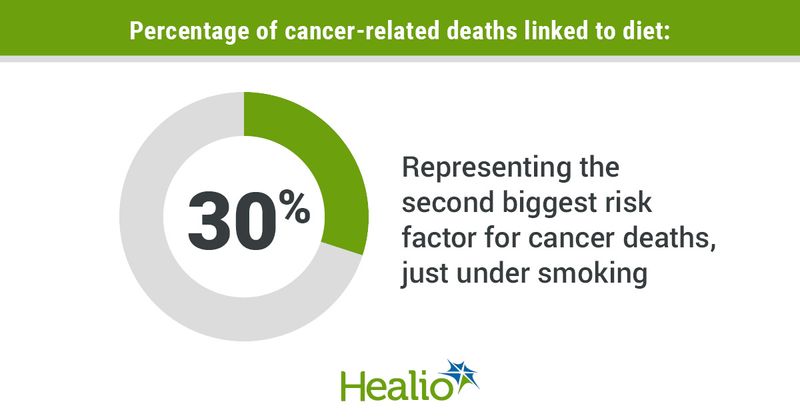
This image is property of www.healio.com.
Prostate cancer
Prostate cancer is one of the most common cancers in men. It occurs in the prostate gland, a small walnut-shaped gland that produces seminal fluid. While the exact causes of prostate cancer are still unknown, certain risk factors, such as age, family history, and race, can increase the likelihood of developing this disease. Research suggests that a diet high in red and processed meats, and low in fruits and vegetables, may increase the risk of prostate cancer. Conversely, diets rich in fruits, vegetables, legumes, and whole grains, as well as healthy fats like omega-3 fatty acids, may help reduce the risk of prostate cancer.
Lung cancer
Lung cancer is the leading cause of cancer-related deaths worldwide. It occurs when abnormal cells in the lungs grow and divide uncontrollably. The primary risk factor for lung cancer is tobacco smoking, but other factors, including diet, can also influence the risk. Some studies have suggested that a diet high in fruits and vegetables, which are rich in antioxidants and phytochemicals, may help reduce the risk of lung cancer. On the other hand, a diet high in processed and fried foods, as well as alcohol consumption, may increase the risk.
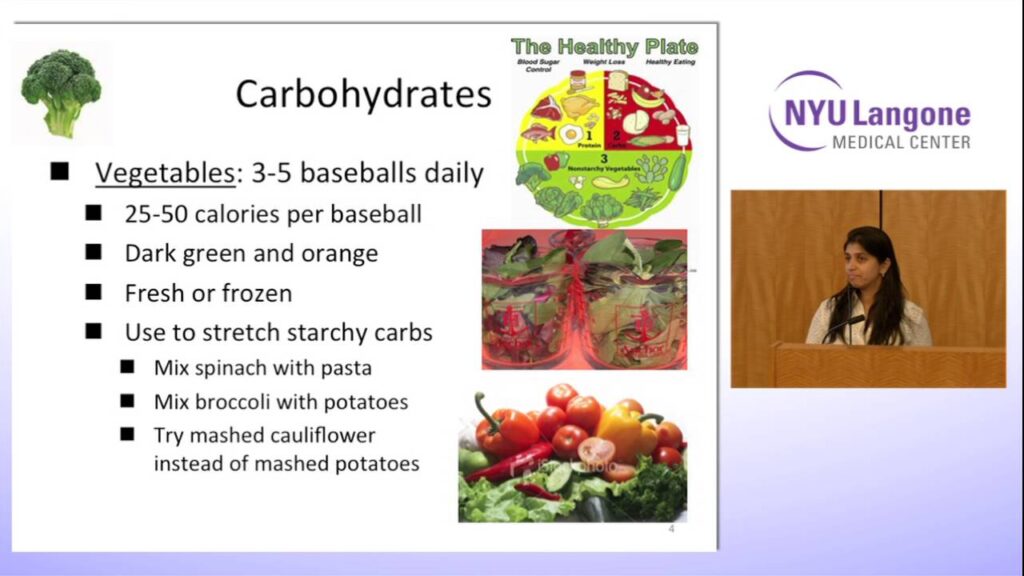
This image is property of i.ytimg.com.
Stomach cancer
Stomach cancer, also known as gastric cancer, is the fifth most common cancer worldwide. It usually develops slowly over many years and can remain undetected until it reaches an advanced stage. Risk factors for stomach cancer include infection with Helicobacter pylori bacteria, a family history of the disease, smoking, and certain dietary factors. Diets high in salted, smoked, or pickled foods, as well as processed meats, have been linked to an increased risk of stomach cancer. On the other hand, diets rich in fruits, vegetables, and whole grains may help lower the risk.
Pancreatic cancer
Pancreatic cancer is a highly aggressive and often deadly form of cancer. It occurs when malignant cells form in the tissues of the pancreas, an organ responsible for producing digestive juices and regulating blood sugar levels. The exact causes of pancreatic cancer are not known, but certain risk factors, including smoking, obesity, genetics, and diet, have been identified. Diets high in red and processed meats, saturated fats, and sugars, and low in fruits and vegetables, whole grains, and healthy fats, have been associated with an increased risk of pancreatic cancer. On the other hand, a diet rich in fruits, vegetables, and whole grains, and low in processed and sugary foods, may help reduce the risk.
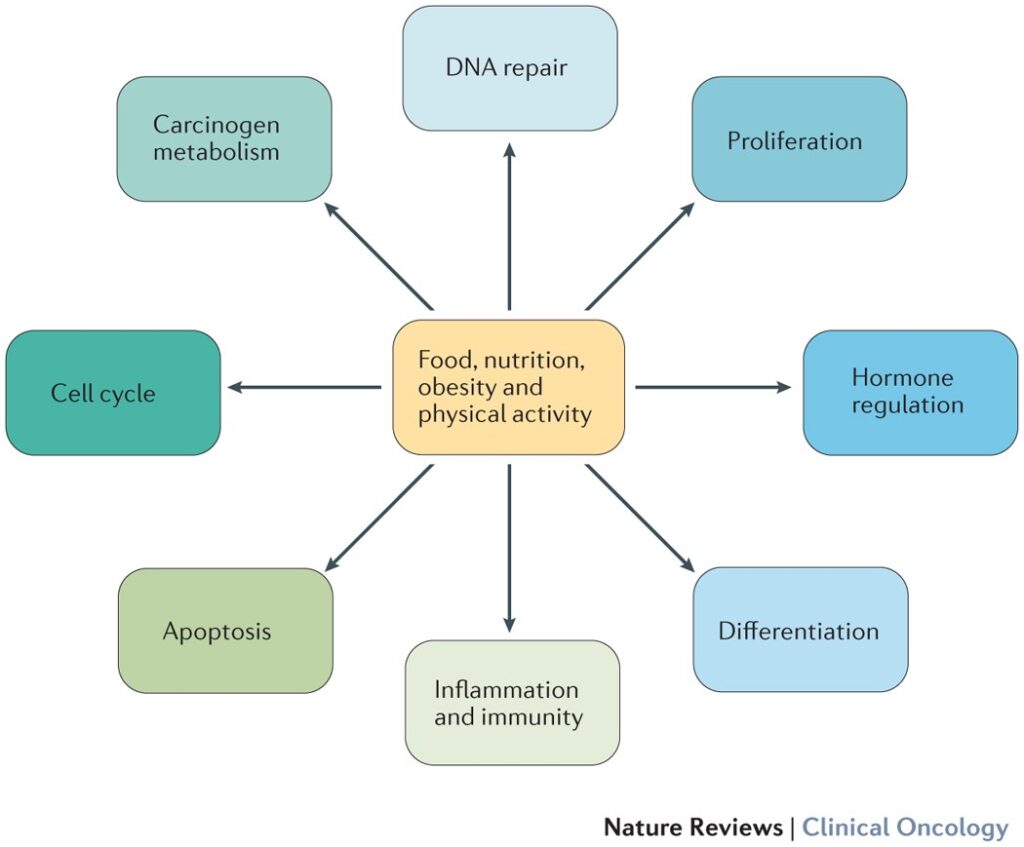
This image is property of media.springernature.com.
Liver cancer
Liver cancer develops when abnormal cells in the liver begin to divide and form a tumor. Chronic infection with hepatitis B or C viruses, excessive alcohol consumption, obesity, and certain dietary factors are known risk factors for liver cancer. Diets high in processed meats, fatty foods, and sugary beverages, as well as excessive alcohol consumption, have been linked to an increased risk of liver cancer. Conversely, diets rich in fruits, vegetables, whole grains, and lean proteins, as well as moderate alcohol consumption, may help reduce the risk.
Kidney cancer
Kidney cancer, also known as renal cell carcinoma, occurs when cancerous cells grow and multiply in the kidneys. The precise causes of kidney cancer are not fully understood, but certain risk factors, such as smoking, obesity, high blood pressure, and certain genetic conditions, may increase the likelihood of developing this disease. Although the role of diet in kidney cancer is not well-established, some studies suggest that a diet high in fruits, vegetables, whole grains, and lean proteins, and low in red and processed meats, may help lower the risk.
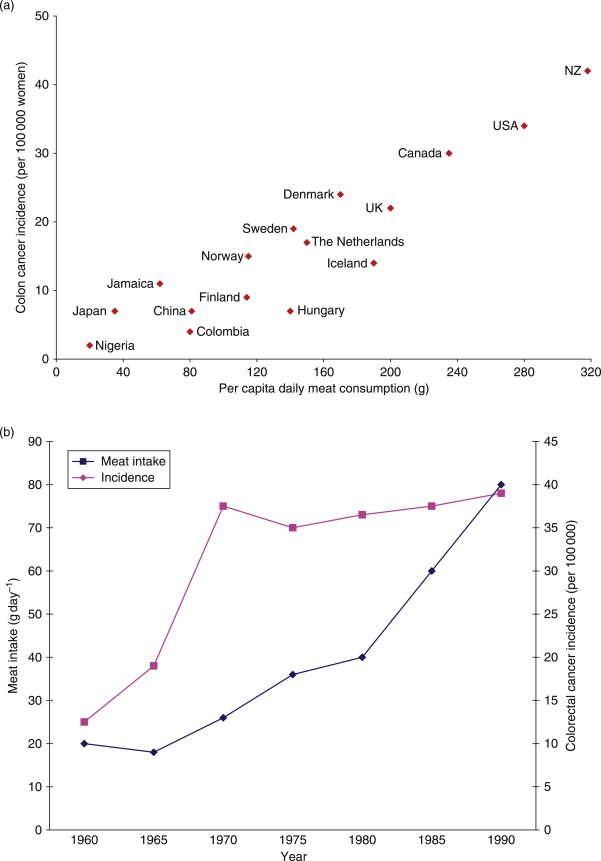
This image is property of ars.els-cdn.com.
Ovarian cancer
Ovarian cancer is a type of cancer that starts in the ovaries, the female reproductive organs responsible for producing eggs and female hormones. The exact causes of ovarian cancer are unknown, but certain risk factors, such as age, family history, obesity, and smoking, can increase the risk. Research on the link between diet and ovarian cancer is limited, but some evidence suggests that a diet rich in fruits, vegetables, whole grains, and lean proteins, and low in red and processed meats, may help reduce the risk.
Skin cancer
Skin cancer is the most common type of cancer, with three main types: basal cell carcinoma, squamous cell carcinoma, and melanoma. Sun exposure, including UV radiation from the sun and tanning beds, is the primary risk factor for skin cancer. While the role of diet in skin cancer is not well-understood, some studies have suggested that certain dietary factors may influence the risk. Diets high in fruits, vegetables, whole grains, and omega-3 fatty acids, and low in processed and sugary foods, may have a protective effect against skin cancer.
This comprehensive guide will explore the relationship between diet and cancer risk, examining the impact of dietary factors, carcinogens in food, macronutrients, antioxidants, obesity, the gut microbiome, and complementary and alternative therapies. By understanding how diet can influence cancer risk, you can make informed choices to help protect yourself against this devastating disease.
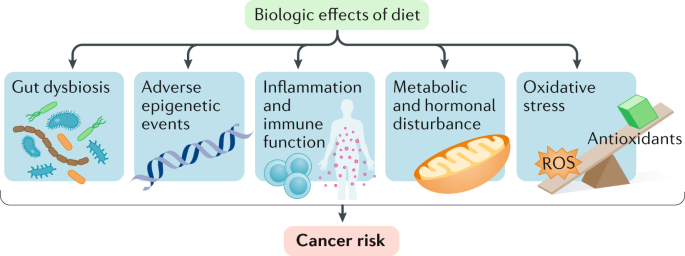
This image is property of media.springernature.com.